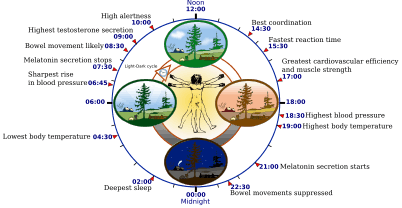
Circadian rhythm
A circadian rhythm /sɜːrˈkeɪdiən/ is any biological process that displays an endogenous, entrainable oscillation of about 24 hours. These 24-hour rhythms are driven by a circadian clock, and they have been widely observed in plants, animals, fungi, and cyanobacteria.
The term circadian comes from the Latin circa, meaning "around" (or "approximately"), and diēm, meaning "day". The formal study of biological temporal rhythms, such as daily, tidal, weekly, seasonal, and annual rhythms, is called chronobiology.
Although circadian rhythms are endogenous ("built-in", self-sustained), they are adjusted (entrained) to the local environment by external cues called zeitgebers (from German, "time giver"), which include light, temperature and redox cycles.
History
The earliest recorded account of a circadian process dates from the 4th century B.C.E., when Androsthenes, a ship captain serving under Alexander the Great, described diurnal leaf movements of the tamarind tree. The observation of a circadian or diurnal process in humans is mentioned in Chinese medical texts dated to around the 13th century, including the Noon and Midnight Manual and the Mnemonic Rhyme to Aid in the Selection of Acu-points According to the Diurnal Cycle, the Day of the Month and the Season of the Year.
Podcasts:
Latest News for: sleep-wake cycle
Frequent bathroom nighttime trips may be warning of heart disease
Newsner 01 Apr 2025I'm a doctor... and your sleeping position reveals a lot about your health | Daily ...
The Daily Mail 31 Mar 2025All you need to know about cortisol and stress
RTE 31 Mar 2025Sunbeds are this year’s most dangerous wellness trend, but can they ever have benefits?
AOL 31 Mar 2025How Hemp Helps You Sleep
East Bay Times 29 Mar 2025The spring clock change may affect your mind and body longer than you realise
The Conversation 28 Mar 2025Common bedtime habit wreaks havoc on your sleep... causing major health problems | Daily Mail Online
The Daily Mail 27 Mar 2025Going to sleep past midnight regularly? Here's what that says about your health
The Times of India 27 Mar 2025Clocks Changing With Kids Is A Nightmare. This 1 Trick Makes It Easier.
Huffington Post 26 Mar 2025Surviving on power naps? Fix your Ramadan sleep for better rest and recovery
Gulf News 26 Mar 2025This 2-hour window is the best time of day to take a nap, sleep doctor says
NBC Bay Area 26 Mar 2025Hiya Bedtime Essentials for Kids – Melatonin-Free Sleep Support for Healthy Sleep Habits
Belleview Reporter 26 Mar 2025- 1
- 2
- Next page »

